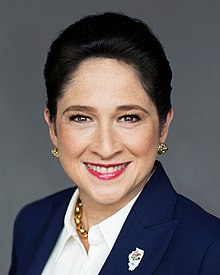Powers and duties
Article V, Section 17 of the Constitution of Illinois states the Comptroller "...shall maintain the State's central fiscal accounts, and order payments into and out of the funds held by the Treasurer." [4] In accordance with this mandate, the Comptroller is designated by law as the chief fiscal control officer for the state of Illinois and thus responsible for the legal, efficient, and effective financial operations of state government. [5] [6] As such, the Comptroller:
- Prescribes uniform accounting standards, records financial transactions, codifies appropriations made by law, and makes adjustments in the statewide accounting system. [7]
- Establishes internal control guidelines applicable to every state agency. [8]
- Orders deposits into the state treasury and approves receipts issued by the Treasurer. [9]
- Audits vouchers certified by state agencies for obligations incurred, including obligations made by the state to its employees and creditors, and issues warrants on the state treasury in payment of vouchers approved, either by signing paychecks or granting approval to electronic payments. [10]
- Administers payroll to state employees. [11]
- Maintains records of inventory and bonded indebtedness for every state agency. [12]
- Monitors cash flow in each state fund and approves interfund transfers. [13] [14]
- Provides monthly debt transparency reports to the General Assembly. [15] [16]
- Prepares the state's annual comprehensive financial report. [17] [18] [a]
- Approves or refuses the sale of state bonds in excess of statutory debt limits. [19] Illinois state agencies, as a matter of law, cannot generally incur debt in excess of sums appropriated by the General Assembly. In practice however, state agencies can incur debt beyond these statutory limits if the resulting bonds are authorized by the Governor and approved by the Comptroller. If approved, said bonds are issued by the Office of Management and Budget, a Cabinet-level state agency, and serviced as to principal and interest by the Treasurer. [20] No other elected state comptroller in the United States enjoys this power over bond issuance. [b]
The Comptroller is charged by statute with certain additional duties. In particular, the Comptroller supervises local government finances throughout Illinois. This function includes reviewing localities' financial statements, collecting financial data and organizing it into user-friendly databases, investigating instances of waste or fraud in local governments, and publishing an annual report summarizing the revenues, expenditures, fund balance, and debt of some 9,000 units of local government. [22] [23] [24] [25] Moreover, the Comptroller regulates cemeteries under the Cemetery Care Act, and is charged with the fiduciary protection of cemetery care funds used for the care and maintenance of Illinois gravesites. [26]
Aside from their regular responsibilities, the Comptroller is fourth (behind the Lieutenant Governor, Attorney General, and Secretary of State, respectively) in the line of succession to the office of Governor of Illinois. [27] [28] The Comptroller is also by law a member of the board of trustees of the State Employees' Retirement System (SERS), the independent state agency that administers public pensions for legislators and their staff, the judiciary, executive branch officials, and the professional civil service. [29]
Merger proposals
Some legislators have perceived a redundancy overlap between the offices of Comptroller and Treasurer, and have therefore proposed constitutional amendments to merge the two offices and earn administrative savings. For example, HJRCA 12, considered by the Illinois General Assembly in the 2008-2009 session, would merge the office of Comptroller into the office of Treasurer. [34]
In 2011, Comptroller Topinka and the Treasurer, Dan Rutherford, introduced legislation to allow voters to decide whether the offices should be merged. [35] The legislation was opposed by Michael Madigan, Speaker of the Illinois House of Representatives, and did not become law. [36]
This page is based on this
Wikipedia article Text is available under the
CC BY-SA 4.0 license; additional terms may apply.
Images, videos and audio are available under their respective licenses.



